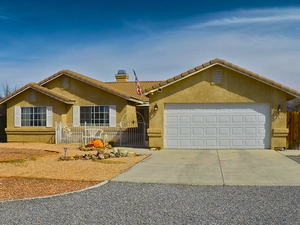UNLV real estate expert Dr. Vivek Sah examines the success
of Southern Nevada’s housing market throughout the COVID-
19 pandemic and how it differs from the Great Recession.
EDITOR'S NOTE
: As the Las Vegas economy continues to rebound from the coronavirus pandemic, Dr. Vivek Sah, director of the Lied Center for Real Estate in the Lee Business School, offers an analysis of Southern Nevada’s housing market and how it stacks up against the greater recovery of the region.
Vivek Sah
From a once-in-a-century pandemic to an irrational stock market, 2020 was a year of anomalies. And you can add the buoyant housing market to the bizarre year. Although housing markets were up across most Metropolitan Statistical Areas (MSAs), the case of Las Vegas warrants particular attention.
Before the pandemic, few would have expected Southern Nevada to be the beneficiary of a growing – least not exploding – housing market during a global crisis. But as we look back on the past year, prices in Las Vegas have averaged a growth of 20% year over year, which ranks among the highest in the nation. For context, consider that Las Vegas was the poster child of the housing crash of 2008, and has an abnormally high reliance on the gaming and hospitality industries.
The lockdowns driven by the pandemic brought the city – which welcomed a record 42 million visitors in 2019 – and its core economy to a screeching halt when hotels and casinos closed their doors in March 2020. While the national average unemployment was around 14%, Las Vegas was the highest in the nation at almost 30%. Conventions, conferences, top Las Vegas sporting events such as the notable National Finals Rodeo, the NFL Draft, and college basketball games were cancelled, as were the dreams of international tourists that flock this unique global destination.
Economic signs were ominous, and to locals, economists, business leaders, and state and local government officials, it was reminiscent of the aftermath of the last financial crisis. Yet, something was different. 2020 was a stellar year for Nevada’s housing market, at least from a pricing perspective, even though volumes for both new and resale were down by almost 40%. Despite mass lay-offs and furloughs across the core business sector, people impacted by such measures could take respite in the surging equity in their homes.
So just how then was this time different than the housing carnage of the Great Recession?
Changing Economic Base
The key long-time driver of any real estate market is the economic base, and more importantly its resiliency during downturns. Over the past decade, Las Vegas has seen gradual economic diversification, with growth in certain sectors and a slight decline in core key sectors. Significant employment generation across multiple non-core sectors relieves Las Vegas of its high reliance on leisure and hospitality, thereby making the housing market more resilient than it was in 2008.
In the last five years, Las Vegas is getting the visibility it richly deserves for its location, income tax benefits, great airport connectivity, and climate. The relocation of the NFL’s Raiders, and the fairy-tale inaugural season enjoyed by the NHL’s Vegas Golden Knights has further brought attention to Southern Nevada as an economic hub that’s much more than a tourist and recreational destination. This diversity, albeit small now, has been key to maintaining a healthy housing market in 2020. As we progress into this decade, we will surely see more companies in manufacturing, distribution, financial services, and health care relocate to Southern Nevada. This will continue to drive up the housing market and help it maintain its resiliency.
Supply Constraints
While the local economy drives housing demand, the supply side is critical as well. Housing supply was abundant during the Great Recession, further adding to the price correction at the time. But the relatively low number of new listings in 2020 is a stark contrast to the high number during the 2008 crash. The global nature of the pandemic put a brake on both new and resale homes. In the case of new construction, the disruption in material supplies, coupled with lockdown restrictions, slowed the pace of new inventory hitting the market.
On the resale side, a limited number of homes hit the market. The pandemic paused job mobility both locally and across the region, as well put the brakes on any upgrades people were considering pre-pandemic due to economic challenges. Overall, despite slightly waning demand, restrictive supply put an upward pressure on housing prices thereby keeping them buoyant throughout 2020.
In-Migration/Changing Demographics
Prior to the pandemic, a significant number of people were moving to Las Vegas, largely from California which has been plagued with high taxes, rising home costs, and a swath of natural disasters. Nevada’s proximity to the Golden State has enormously benefited it, and the timing of this relocation has coincided with a growing economic base.
Mortgage Forbearance
Apart from the other fundamental shifts described, the mortgage forbearance program installed by the federal government, coupled with other state moratoriums, has definitely contributed to the current housing market. With the program set to expire in the second half of 2021, a small “correction” in the market could be expected. However, there will likely be a more robust economic recovery by then with normal travel resumed, thereby opening up the city for conferences and events. As we progress towards a full economic recovery over the next year, housing demand from local households who were affected by the economic distress is likely to rebound, potentially offsetting any increase in supply of distressed assets.
What’s Next?
2020 was a stellar year for prices, but that was an anomaly largely due to various factors, particularly the mortgage forbearance which was the artificial plug shielding the market. Despite volatility across markets and fears of inflation, interest rates are expected to be kept low until 2022 to support broad economic recovery. Las Vegas in particular will see job growth (or we should say reabsorption of lost jobs) sustained till mid-2022. While the housing markets are expected to keep expanding for the next year, we need to keep a close watch on interest rates, and market supply (both new construction, resale, and distressed assets). This will dictate the price growth, which is expected to slow down to normalcy, which I believe is more rational.
Source : https://www.unlv.edu/news/release/housing-markets-pandemic-curious-case-las-vegas







